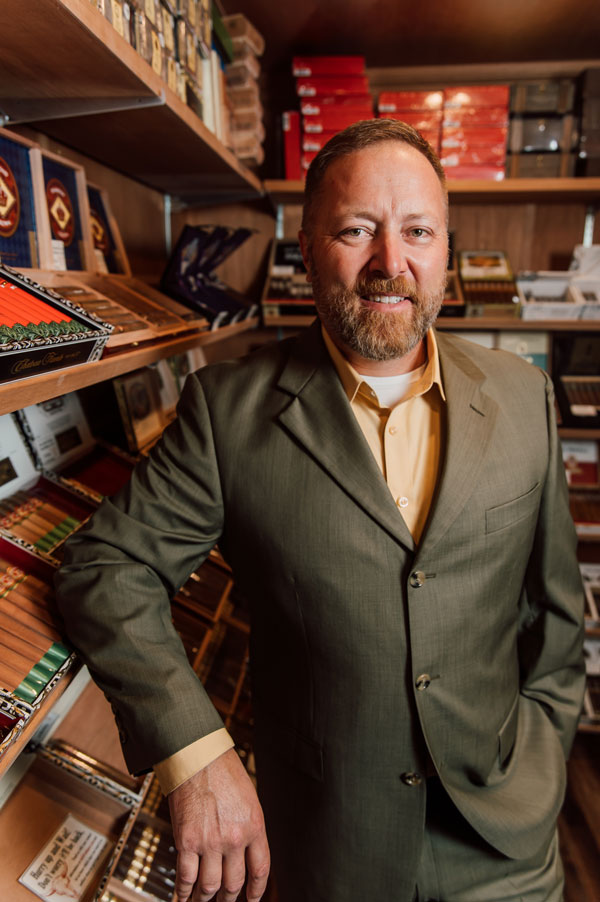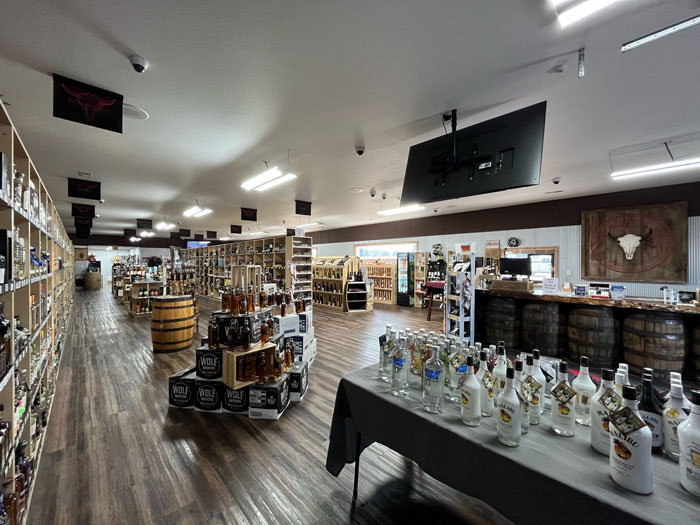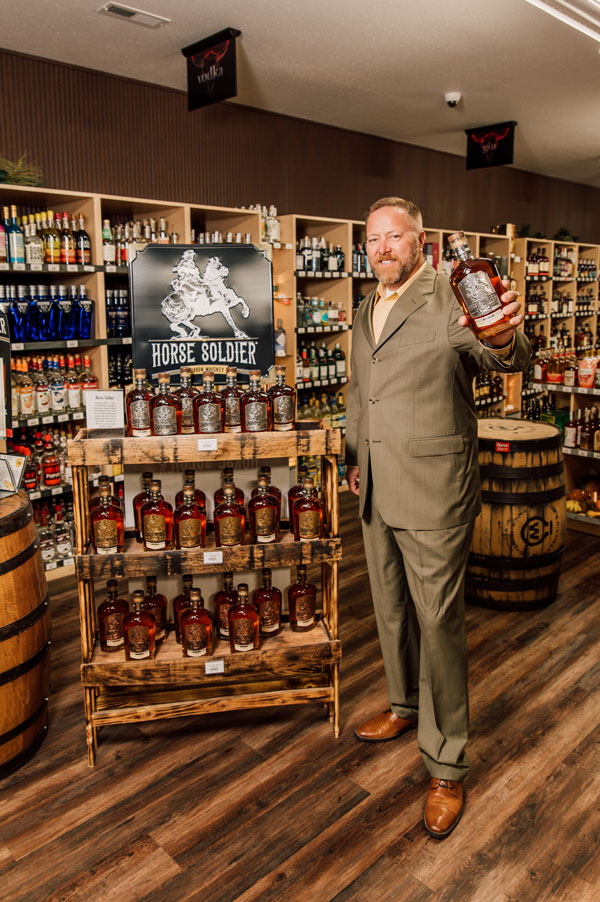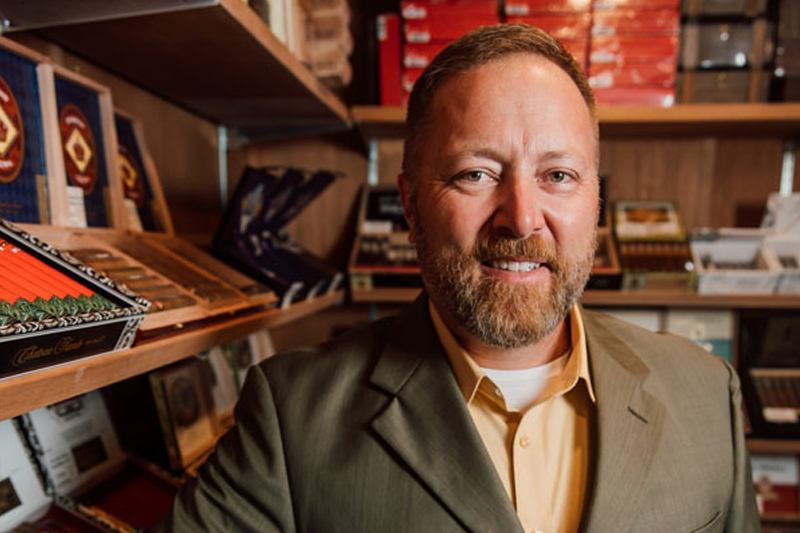Ken Weinheimer is a self-effacing and soft-spoken man. To converse with him you would never guess that he had created the largest walk-in cigar humidor in the state of Montana, built the state’s first and only 24-hour, private membership cigar lounge and almost singlehandedly saved the retail cigar business in his home state of Montana. That’s saying a lot, but there’s even more to his story.
Weinheimer began his professional career as a Deputy Sheriff in Great Falls, Montana. There he was introduced to aviation. By early 2002 he realized he wanted to fly full time, as he had already been flying a plane. “I got a ride in a helicopter and decided that’s what I wanted to do,” he recalls. He is still an active pilot, and owns his own aviation business, Mission Mountain Helicopters. But his entrepreneurial instincts were not yet satisfied.
When he learned of a liquor store for sale which had an Agency License, the type that would enable the license holder to both retail and distribute on a wholesale basis, he investigated the business and decided he liked what he saw. “But I wanted it to be on a much larger model, so I bought the liquor store and a much larger piece of property, and that’s where I created Rocky Mountain Liquor, just a little over two and a half years ago,” adds Weinheimer.

The liquor business he bought did not carry cigars, and since there was no adequate place to display them in the store he had just acquired, he knew that the new location he was in the process of building would have to be designed to feature cigars. An avid cigar smoker prior to acquiring the liquor store, Weinheimer enthusiastically states, “Cigars are a complete passion of mine, and something I truly love every aspect of.” Therefore, cigars would receive priority during the design phase of the new store. “When we built this, literally the first room I set up was for the humidor,” he says. “We built the store around the humidor.”
In addition to making cigars central to the liquor store business model, Weinheimer also envisioned creating a private membership club. He explains its evolution as follows: “The Capital Club is the name of our cigar club. While we were framing out the location we were able to make a lounge out of another section of the building. We worked on the store and the club simultaneously.” While they are part of the same structure, the lounge is physically separate from the retail store. Weinheimer explains, “You have to exit the liquor store and come in a separate entrance, in order for us to be compliant with state law. It’s a private membership lounge, and as a result, it has to have its own air-handling system.”

The Capital Club is an official Kristoff Signature Lounge offering three levels of membership, and features 24-hour access through a personal pin code. Members are encouraged to bring guests, and kitchen services are available. The lounge has a state-of-the-art air handling system, and offers private lockers at the founding member level. The club currently boasts around 40 members. In addition, Weinheimer has established reciprocity with two other lounges in Montana, so his members enjoy privileges at those other clubs as well.
The vast walk-in humidor features both boutique and major brands of cigars. Among its top sellers are Perdomo, Kristoff, Eiroa, Esteban Carreras and La Flor Dominicana. Three Montana brands of cigars are offered, one of which is Weinheimer’s own line named Tatanka, a full-bodied blend developed by Weinheimer, consisting of Nicaraguan fillers with an Ecuador Habano binder and a San Andrés wrapper. Not only is Tatanka one of Rocky Mountain Liquor’s top sellers, it is wholesaled to other retailers within Montana and now out of state as well.
What might be Weinheimer’s greatest accomplishment came about as a result of his commitment to never charge more than MSRP across the board for all merchandise in his retail store. This created quite a challenge when he discovered that the state of Montana imposed a 50 percent wholesale tax on all premium cigars. If he followed traditional mark-up models, a cigar with a $20.00 MSRP would cost $30.00 including the tax. He realized: “As an avid cigar enthusiast, I know what I would pay in another store. I’m very up to date on cigar and accessory prices, and I’m just not interested in price gouging. We have some extremely hard-to-get cigars, and still I won’t jack the price up on anybody.”

In order to stay true to that ethos, Weinheimer faced a tough decision regarding how to price his cigars. He recalls, “When I started Rocky Mountain Liquor there was a lot of conversation about do I keep it MSRP or keystone the total cost? It was my decision to stick with MSRP, so for the first two years I ate the tax. I told everyone I would only sell at MSRP, and I won’t go back on my word.”
Naturally, working on a narrow markup of only one or two dollars per cigar would not be viable going forward, but Weinheimer had a plan: “I knew I was going to propose legislation to amend the very antiquated tax law.” What he didn’t know was what it would take to accomplish such a lofty goal. When asked how he was able to get started proposing legislation when he had no previous political or legislative experience, Weinheimer laughs and answers, “It always starts with knowing a guy!” In this case it was two guys, well-known state lobbyists Scott Boulanger and Jon Sonju. Weinheimer explained what he wanted to get done and asked them how to go about it. This was one year before the legislative session would start, so he knew this would be a long process. He wanted to be able to emphasize that the tax amendment was not based on one’s opinion of the merits of smoking. He told them, “I wanted to support the brick and mortar stores in Montana. I saw the tax as a sin tax which dated back to 1957, and my research showed that no one had ever attempted to get the tax amended.”
The lobbyists recommended that Weinheimer needed to make himself known in various circles, that he needed to introduce himself to different people—“Which I did!” he exults. “I’m always trying to be friendly, trying to meet new people.” The lobbyists had given him a road map, and he spent the next year participating in various events throughout the state, getting to know the state house representatives and senators. His message got through to the right person, Senator Greg Hertz, who sponsored a bill capping the tax on premium cigars. That was just the start of the journey.
The lobbyists offered to back Weinheimer, repeating his argument to the right people, but emphasized that essentially he would have to sell himself. They provided lists of people with whom to meet, even facilitating many of those meetings, but as he himself puts it, “It was me who did the talking, who made the bullet points, had the excel spread sheets, showing what other states had done. They would then say who the next person or group that I would need to meet was, right up through the Department of Revenue.”
Weinheimer also funded 99 percent of the effort, as few others actually believed he’d be able to get the tax amended, and didn’t want to put their funds into a losing enterprise. Weinheimer’s yearlong, pioneering efforts were rewarded when Senate Bill 122, a cap of 35 cents per cigar, was enacted May 19, 2023. The state is still working out how to apply the tax at the new rate, and Weinheimer is still absorbing the previous 50 percent tax on his cost, because, as he says, “It was important for me to earn the trust of all my customers.” Currently he is working toward getting the overpayments credited back to the new tax’s inception date.
His one-man campaign to amend the excise tax has given Weinheimer the reputation as someone to be consulted by those looking to achieve a similar goal. “I’ve actually received calls from a number of other groups. I’m very open to going to another neighborhood, or another state, and help out where I can.” And while he acknowledges the enormous amount of time and energy required for such a campaign, he found it to worth it because, as Weinheimer emphasizes, “It was for the greater good for small business.”
In addition to a year and a half of exhaustive effort to amend the state’s cigar tax, Weinheimer still devotes much of his time to running both his aviation business and his private club and liquor and cigar business, which he says have experienced phenomenal growth. He has fielded requests to open a similar operation elsewhere, and in fact states, “I’m looking at other markets right now. I’ve had other markets call me. For about two months I’ve been researching other locations, both in my state and out of my state.”
While it certainly seems possible to replicate the business model for creating additional cigar lounges, what may prove more difficult is to reproduce the personal commitment to customer service Weinheimer naturally exemplifies. He demonstrates that ideal by saying, “It’s a very customer service driven business. On all my business cards I have my personal cell phone. Any time of day, if someone’s in the humidor and has a question, I’ll stop and take the call. Whether it takes 10 minutes or it takes an hour, I will walk everybody through the humidor. That kind of customer service resonates with people. You take care of your customer base and they take care of you.”
With that kind of attitude, and his positive approach to doing business, Weinheimer is sure to continue to succeed, whether in Montana or wherever he may choose to apply his well-honed business acumen, and spread his good-natured optimism.
– Photos by Floating Leaf Studios. Story by William C. Nelson.
This story first appeared in PCA The Magazine, Volume 4, 2023. To receive a copy of this magazine you must be a current member of PCA.

